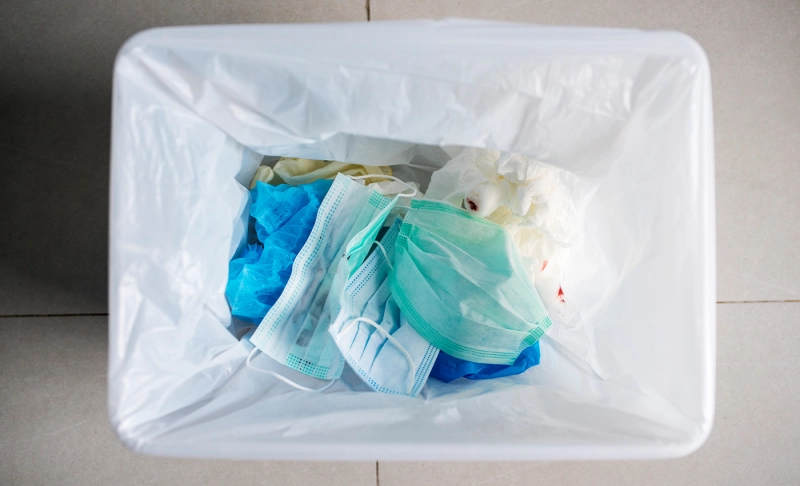August 26 2021
False: COVID-19 is not contagious because there are no biohazard bins for the disposal of used masks and gloves.

The Verdict False
Masks and gloves used to contain COVID-19 are not considered infectious waste and can be disposed of as trash.
Masks and gloves used to contain COVID-19 are not considered infectious waste and can be disposed of as trash.After almost two years and over four million COVID-19 deaths, questions asking if COVID-19 is really a dangerous or contagious disease are still on social media platforms. One post asks why we don’t dispose of our masks and gloves in biohazard bins and implies that the COVID-19 is not contagious because this is not a common practice. The Centers for Disease Control and Prevention (CDC) advises that medical waste coming from healthcare facilities treating COVID-19 patients is no different than waste coming from facilities without COVID-19 patients. According to Oregon’s Department of Environmental Quality (DEQ), medical waste means waste that is generated as a result of patient diagnosis, treatment, or immunization. The DEQ advises that most medical waste associated with the diagnosis and treatment of COVID-19 is not considered infectious waste, also known as biohazardous or biomedical waste, and should not be incinerated or treated any differently than routine medical waste. Personal protective equipment (PPE) such as masks, gloves, gowns, and disposable wipes, and waste that is not “saturated” with blood or other bodily fluids do not require treatment and can all be disposed of as trash. That said, infectious waste (such as cultures and stocks, such as specimen cultures, serums, and vaccines), biological waste, (such as blood, bodily fluids, and materials) saturated with bodily fluids require treatment by sterilization or incineration. The same reasoning can be applied to non-healthcare settings and COVID-19 waste management. Dr. Amesh Adalja, a researcher at the Johns Hopkins Center for Health Security told the New York Times that although everything humans touch is probably covered with bacteria and viruses, most used masks don’t pose a risk, and masks used by the public are not considered biohazardous. The CDC advises that the principal mode by which people are infected with SARS-CoV-2 (the virus that causes COVID-19) is through exposure to respiratory fluids carrying the infectious virus. This exposure occurs in three principal ways: (1) inhalation of very fine respiratory droplets and aerosol particles, (2) deposition of respiratory droplets and particles on exposed mucous membranes in the mouth, nose, or eye by direct splashes and sprays, and (3) touching mucous membranes with hands that have been soiled either directly by virus-containing respiratory fluids or indirectly by touching surfaces with the virus on them. Current evidence strongly suggests transmission from contaminated surfaces does not contribute substantially to new infections. Dr. Paul Offit, an attending infectious disease physician at the Children’s Hospital of Philadelphia, told PolitiFact that the masks can be safely disposed of because the coronavirus doesn’t spread or survive easily on surfaces. CDC advises that the existing COVID-19 recommendations remain effective. These include physical distancing, community use of well-fitting masks (e.g., barrier face coverings, procedure/surgical masks), adequate ventilation, and avoidance of crowded indoor spaces. The COVID-19 pandemic has given rise to a lot of potentially dangerous misinformation. For reliable advice on COVID-19, including symptoms, prevention, and available treatment, please refer to the World Health Organization or your national healthcare authority.


